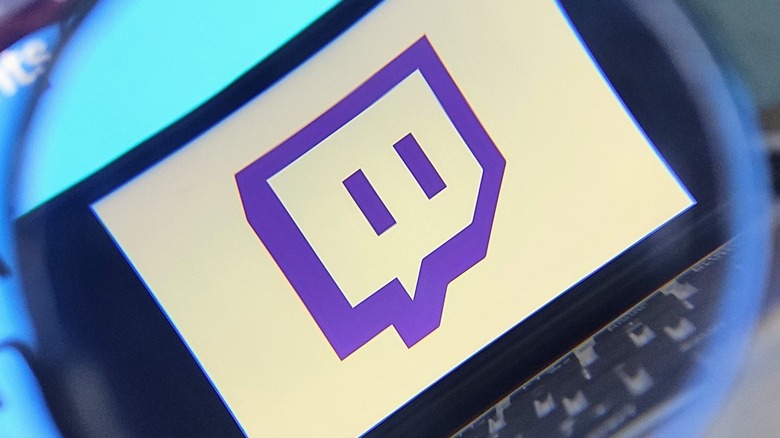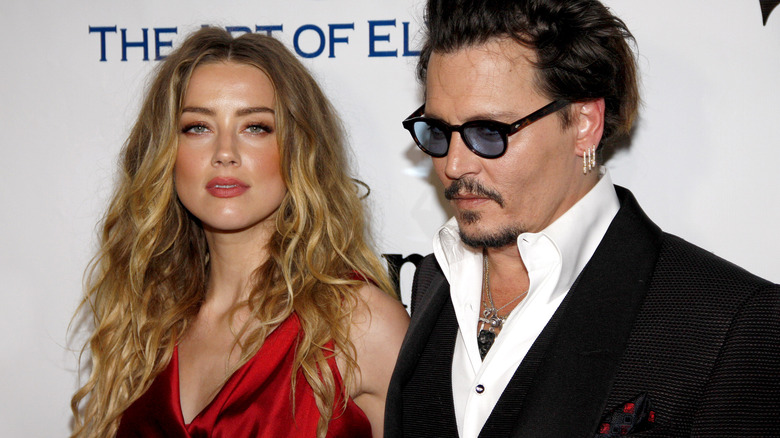Forget Hot Tubs, These Are Twitch's Strangest Metas Ever
In 2021, Twitch was rocked by the sudden skyrocketing popularity of what came to be known as the "hot tub meta." Quite simply, streamers began going live while lounging in a jacuzzi or a pool, sometimes with a cute floatie as company.
The trend blew up quickly, and hot tub stream pioneers like Amouranth and IndieFoxx gained fame and notoriety alike as audiences either fully embraced the new meta or rallied against it as loudly as they could. Viewers and content creators eventually moved on from the meta (for the most part), even as Twitch instituted a new category specifically for these types of streams. Such is the nature of streaming and keeping up with trends.
It seems a new meta takes Twitch by storm ever few months, particularly as new fads enter the public consciousness or a hot new video game hits store shelves. And while the hot tub trend was seen as one of the wildest eras in Twitch history, it was far from the only strange meta to gain a stranglehold on subscribers.
'Implied nudity' and censor bars
In late 2023, a number of content creators gained traction on Twitch by pretending to stream topless — quite literally positioning the camera to give the illusion of nudity. Following a number of bans and suspensions for creators like Morgpie and AsianBunny, Twitch rolled out new policies allowing for "artful nudity," only to then walk them back after several streamers took things too far with the new guidelines. Since then, Twitch has continued to keep an eye out for the naked human form on its platform. However, the platform seems to have been a bit more lax when it comes to the parodic "censor bar meta" that rose up in the wake of this controversy — at least, so far.
This meta is exactly what it sounds like: Streamers put strategically-placed digital censor bars over their private areas while they game and chat with viewers. Some have used this new meta as a means to titillate their audience, while others have looked at it as a way to send a message to Twitch about how ridiculous its relaxed standards have become. After appearing in a spirited stream with seemingly nothing covering his private parts but a black censor bar, Twitch streamer Tectone quipped on X, "I've started a revolution it seems." Meanwhile, Boogie2988 received a brief suspension from Twitch after following suit (in his birthday suit). Some streamers, including Amouranth, have worn physical versions of these censor bars, resulting in unexpected wardrobe malfunctions that showed viewers more than they intended.
This was one meta that seemed specifically designed to push the platform's content guidelines to the absolute breaking point, and it worked: On Jan. 3, 2024, Twitch rang in the new year by officially banning implied nudity from the platform.
MasterChef and TV reaction streams result in bans
Initially known as the "'MasterChef' meta," this period of time saw streamers binge-watching reality shows — including Gordon Ramsay's cooking competition — and reacting to them for the viewing audience. The meta eventually grew to include reaction streams built around other TV series and movies. Despite the fact that this flouted a number of Twitch guidelines and copyright laws, streamers continued to risk it all in the name of subscribers and hilarious Gordon Ramsay clips. As streamers began receiving DMCA strikes from the copyright holders behind the shows they were watching, only to continue watching said content, some viewers even began to suspect that the danger itself was an integral part of the meta.
The results of this meta were disastrous for some streamers. Pokimane received her very first Twitch suspension for watching "Avatar: The Last Airbender" on her channel, yanking her off of the platform mid-stream. Disguised Toast was also suspended shortly afterwards, although he claimed that he was purposefully pushing his luck to see if he could send a message about how bad the latest Twitch trend was.
Unlike some of the other trends discussed here, the TV-watching meta never fully went away. It's certainly less prevalent now, but it has seen an occasional resurgence in other forms...
Johnny Depp and Amber Heard's trial became fodder for Twitch
Taking the TV meta one step farther, many Twitch streamers turned to a specific bit of entertainment news and gossip to drive views: coverage of the defamation trial between Johnny Depp and Amber Heard. As Depp took Heard to court to sue for damages following their public divorce and her accusations of abuse, subscribers turned out in droves to see their favorite streamers weighing in on the proceedings.
Pokimane, Asmongold, and xQc were among some of the bigger names checking out the trial and giving their honest reactions to the testimony and evidence. Some streamers picked a side in the trial and would make the case for the party they believed to be innocent, while others were simply there to offer color commentary. Some streamers even got meta with this meta by reacting to streams of other streamers reacting to the trial. Truly, the snake quickly began to eat its own tail here.
Despite the popularity of this meta, many of the streamers involved came under scrutiny for engaging with such a sensitive topic for views. However, as noted by lawyer and YouTuber Richard Hoeg in a chat with Kotaku, some good may have come from this meta in the end. By watching informed channels like Virtual Legality parse the details of the trial, some viewers may have actually been able to better process its finer points. Whatever the case, the court commentary meta has yet to experience a resurgence on this level.
The fart meta. Just -- the fart meta.
Even if you're unfamiliar with the upsettingly-named "fart meta" by name, you've likely encountered one of its most infamous byproducts. If you've ever seen an out-of-context clip of Amouranth dressed as Spider-Gwen and wearing a horse mask as she thrashes against the microphone, then guess what? Ya been fart meta'd.
Yes, despite the name, the fart meta actually encompassed a wide variety of activities beyond the obvious. The trend cast a wide net as streamers attempted to one-up each other in absurd, gross, and occasionally titillating behavior. Some streamers also passed gas directly into the mic (as one might expect from the name), but that wasn't the end-all be-all of this short-lived meta. In a few memorable streams, Sasha Grey squished a whoopie cushion and made squelching noises with her mouth when she hit certain subscription tiers, all while wearing a purple costume wig. She even promised to saran wrap herself if she hit her subscriber goal for the night.
The fart meta was characterized by crude humor and silly behavior, acting as something of a satire of previous metas. While it certainly brought in an audience and the creators involved seemed to have fun with it, not too many people miss it, now that it's gone.
Exploiting VTuber tags
VTubers are a fascinating part of the streaming community. These virtual streamers are typically single streamers utilizing an animated avatar for their channel, giving themselves a bit of anonymity and allowing them to present audiences with an offbeat or larger-than-life persona. Even major companies have gotten in on the action, creating VTubers to entertain viewers (and promote their products, of course). VTubers have risen in popularity over the last few years due to the efforts of streamers such as CodeMiko and Ironmouse. Unfortunately, one particularly frustrating Twitch trend saw streamers manipulating content tags on Twitch to capitalize on the success of VTubers.
In 2022, Dexerto reported on a rise in mislabeled streams on Twitch. A disconcerting number of streamers — at least half of the top 12 creators — were found to be using the platform's "VTuber" tag when they were not, in fact, broadcasting with an animated avatar of any kind. Despite big name streamers like xQc insisting that it wasn't a big deal, this trend prompted an outcry from the platforms actual VTubers and their fans.
As noted by VTuber Marina, tag abuse like this "makes discoverability more difficult for both streamers who are actually Vtubers, and viewers trying to use the tag system to find Vtubers." Luckily for all involved, this was yet another short-lived trend.





